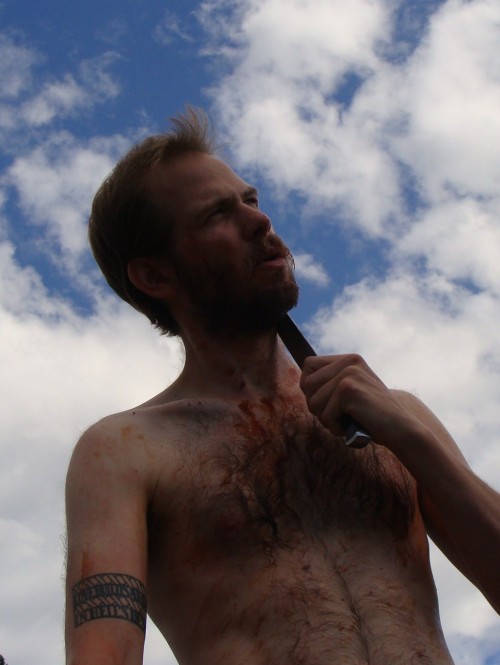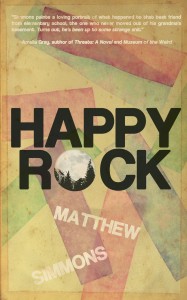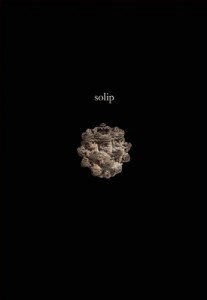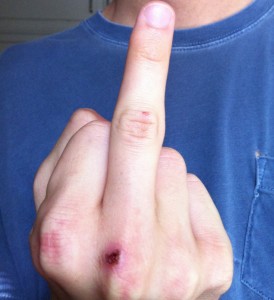Monstrous Women: An Interview with Alissa Nutting
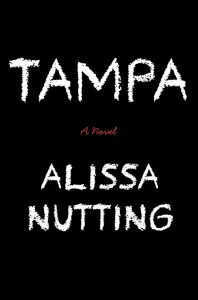 I learned about Alissa Nutting’s debut novel when I put together some half-baked thoughts on Amazon’s purchase of GoodReads. I came across the Book Page for Tampa and noticed that there were a lot of really weird reviews. One said the book was “ too explicit, too graphic, and too weird…to finish;” another said, “I don’t think women will read this for a thrill, especially anyone with school-aged sons.”
I learned about Alissa Nutting’s debut novel when I put together some half-baked thoughts on Amazon’s purchase of GoodReads. I came across the Book Page for Tampa and noticed that there were a lot of really weird reviews. One said the book was “ too explicit, too graphic, and too weird…to finish;” another said, “I don’t think women will read this for a thrill, especially anyone with school-aged sons.”
These reviews weren’t surprising–people have weird responses to sex. People have even weirder responses to stories about young female teachers who seduce their barely-pubescent students (and yeah, that’s sort-of-but-not-really the plot of Tampa). But still, I was not happy about these reviews, even before I read the book. I didn’t know Alissa then, but I knew her work well enough to know that she would not write a book like this just to be a sensationalist.
Tampa is not a book about pedophilia–it’s bold, sharp critique of the unreasonable expectations and the myopic judgments that contemporary women face on a day-to-day basis. The subject matter may be shocking, harrowing, and morally repulsive, but what makes Tampa so important is that this isn’t really satire. This stuff (and the ridiculous conversations around each instance) happens every day.
I don’t want to reveal more because I think you should read this book. I think you should react to it, and think about why you’re reacting to it. I think it’ll teach you something about the way you think about women.
Alissa deserves thoughtful responses to her work, because this book is really damn good. I wanted to talk to her about some things—about her intentions, her process, and her fears. I’m really grateful to know Alissa now.
MC: What made you want to write Tampa?
AN: I primarily devote myself to female characters, and I’m drawn toward topics that evoke social discussion. One of my areas of interest is monstrosity, and I was very aware that there aren’t many novels that follow a predatory female protagonist–especially a female sexual predator. Women are tasked with the social role of nurturer, so it’s taboo for them to perform any act of violence that isn’t protective or defensive. But it’s doubly taboo if that violence is sexual and the victim is male. As a society, we aren’t simply conditioned to accept males as victims of sexual violence perpetrated by females. This book is meant to challenge and engage that blind spot.
Joe Hall’s Poetry Road
****
Joe Hall is currently about two-thirds done with a 35 day reading tour in support of his new book, The Devotional Poems, and while staying with me here on his Seattle stop, Joe and I did a little interview and photo shoot. (The rule, fyi, for the interview was that Joe could only answer with phrases and lines from his new book.)
******************************************************************************************************************
Besides Willie Nelson’s “On the Road Again” & Bob Seger’s “Turn the Page” what sort of music and sound things have you been listening to on the ol’ lonesome Poetry Road?
In the motherfucking sounds and motherfucking light
All the horns that do not blow
A stethoscope and a quarter ounce
Getting loose, kind of stupid
******************************************************************************************************************
Away from Cheryl (yr monogamous partner of over 7 years , whose absence you named your DC Reading for:“Cheryl’s Gone”), how do you deal with physical loneliness and arousal of the Poetry Road (all the Sirens, deserts, Mermaids, thorn-stimulants, wenches, etc, etc, yawn,…)???
I wake up and my balls are dragging behind me
Like wet paper bags of trash
So I murder that huge ball of pink grasping
Hands
With one shrinking word
Waiting on tender feet
Blotched faces to the flames
I never meant to go, to flee, to leave you READ MORE >
Seattle Author Spotlight (2) — Maged Zaher
Thanks for all the great feedback on the Author Spotlight I did on Richard Chiem! So many flowers (awwww)! So much chocolate (awwww)! And even a phone call from the president which, sadly, went to voicemail. It’s really all been kind of overwhelming (sigh, swoon). But, here anyways, now, is the 2nd Spotlight– on Maged Zaher!
Maged Zaher is very engaging, warm, likable, and was born in a great year (1967, a year in which Rauan Klassnik and Aase Berg were also born.) Maged is currently up for Seattle’s “Stranger Genius Award” which comes with a $5,000 prize. So, congrats, man, & good luck!
(Brendan Kiley, in The Stranger’s write-up on Maged Zaher, describes our Spotlight Author as a “merry melancholic” and goes on to say that “in Zaher’s work, intimacy is the gold medal, but also something to be feared.”)
It was a real pleasure hanging out with Maged for a couple of hours earlier this week. Maged likes to talk poetry, ideology, politics, sociability, soccer, etc, etc. And he’s totally cool with strong, differing opinions which, well, suited me just fine!
This spotlight, then, is comprised of a brief bio, a short interview and a couple of photos. So, say hello now to Maged Zaher!
READ MORE >
5 Points: Happy Rock
— do you like Mothers exploding?
— hopeful suicides?
He produced a rope of fake pearls. They cinched them under her breasts, coiled them around her neck.
Marie said: “This seems wrong, though. I don’t like being tied.”
Eugene agreed, and they never used the pearls around neck or over her wrists, or around her ankles again.
***
. . .Eugene barely hears the phone ring. But it rings. On the roof, Eugene is laying down sod. He lays it over the shingles. He has a bucket of worms. He lays down the sod and sprinkles it with worms.
— Blood dried in a Rush groove? (just a drop. a single rose drop)
— Smashed-up windows falling like snow & crunched underfoot (the highlight of yr life)?
you can order Happy Rock here
Gary Shipley talks with David F. Hoenigman
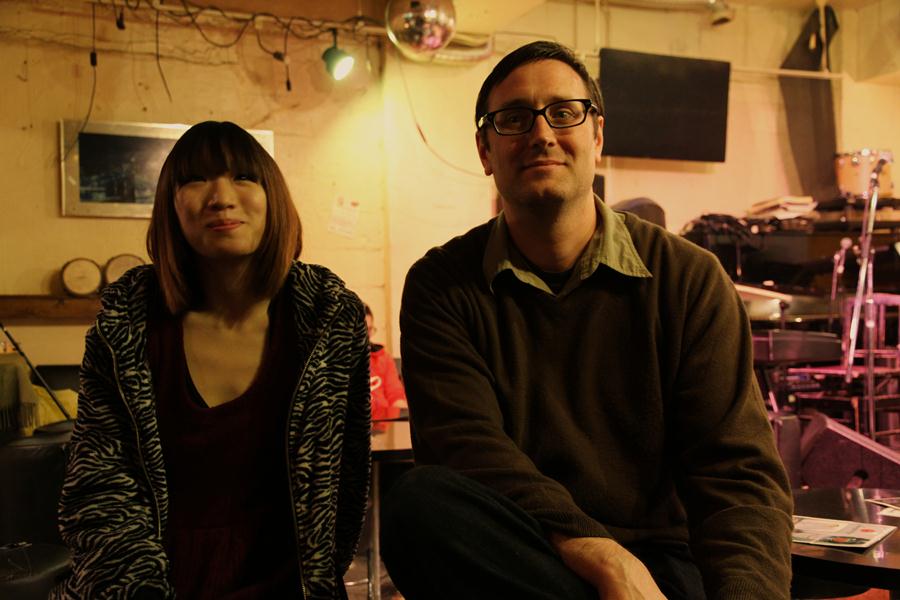
David F. Hoenigman with Denpapapa vocalist Naoko Suzuki at PAINT YOUR TEETH vol. 20 (03/30/2013) Tokyo, Japan (photo by Alex Paillé)
An author of a novel directly influenced by film (You With Your Memory Are Dead, written during a 2-week-marathon viewing of Begotten) asks another author of a novel directly influenced by film (Squeal For Joy) some questions about making monsters.
June 6th, 2013 / 7:01 pm
Seattle Author Spotlight (1) — Richard Chiem
I’ve lived in Seattle for a little over two years now and since AWP, the big show, is coming to town next year I thought it might be a good idea to introduce you to some of its stand-out authors. (I plan to do this periodically. ra ra ra.) And you’ll get the sense, after a while, that Seattle has a strong and growing lit scene. (the first year or so I just stayed in and took baths all day, but now I’ve ventured out and discovered some of what’s on offer. and there’s a lot.).
The first spotlight’s of Richard Chiem. Richard’s great to read, talk to, be with, has great energy, and is very shrewd, kind and edgy. Richard Chiem and I kind of hit it off right away and have gone on walk talks together. Ice cream and pizza sit talks too. We talk all sorts of shit: UFC, literary Gods, Collage Methods, Fucking the Reader, Dwarves, etc, etc. And this weekend we’re dim sum double dating!
So, anyways, Richard Chiem’s Seattle Author Spotlight consists of a brief interview, Bio and photo.
Brief Bio:
Richard Chiem (b.1987) is the author of YOU PRIVATE PERSON, a collection of short stories published by Scrambler books. His work has appeared in Thought Catalog, CityArts Magazine, and Everyday Genius, among other places. Richard lives in Seattle with his girlfriend and their loud cat. He is currently working on two novels.
Brief Interview:
Rauan: How does Seattle make, or make it into, yr writing? (plz be brief)
Richard: When I write about rain right now it’s about Seattle. But other than those few instances, Seattle hasn’t made it to the foreground quite yet. But I love this city. It’s finally my home. I am thinking about writing a novel about a cult or secret colony in Seattle. There seems to be a lot of things here waiting to shock and be discovered.
RK: To give our readers a taste could you plz quote a sentence or two from yr debut collection of short stories, You Private Person (aka YPP, which, for the record, I think’s a novel) (plz be brief) ?
RC: ‘Love feels like a thing people eventually learn to live without like tonsils or god.’
RK: The voice in YPP comes off as quite a “sensualist,” enjoying the transformations before sex, etc. Your thoughts? (plz be brief)
RC: I don’t know if you did this, and it was a thing I started to do when I was younger, but whenever I had a pain in my left hand, or a bump or scar or something, I would check my right hand to see if the same thing was there. I would do this with friends too, meaning if I was having some fucked-up day, I would ask if they had fucked-up days too. I learned how alone I was in some moments, and how common some experiences really were among my peers.
I value the little scenes, sometimes sensory observations, that make up our long boring ass days. In how we mirror each other. Or not at all.
Shanna Compton, Designer
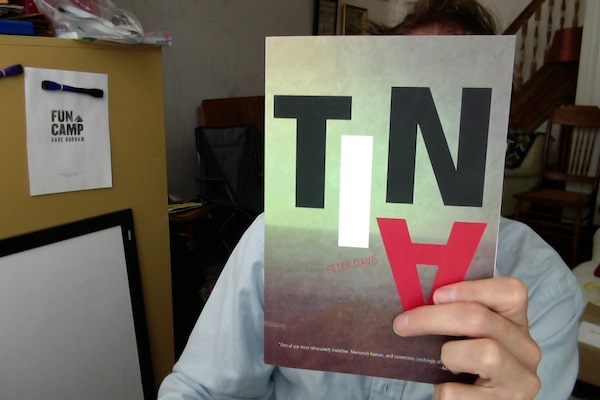
I just got the new Peter Davis book in the mail, Tina, published by Bloof Books.
I haven’t read it yet. This is just to say that Shanna Compton is one of my new favorite designers for poetry books. Her own book, Brink, is also wicked handsome. She has successfully rethought every element of a good book design. Why put what where? The advance praise is at the end. The copyright data gets a line at the bottom of the Table of Contents because that stuff is ugly.
Also, I love Peter Davis’s poetry. Get this for your summer shelf, silly. Review it for HTMLGiant, whydoncha? Watch the trailer, which is better than your average book trailer:
My Pet Serial Killer Video
Check out this My Pet Serial Killer (by Michael Seidlinger) Video Review by Angela Xu and Peter Tieryas Liu. Starring Hannah Lee. Read Peter Tieryas Liu review on HTMLGIANT here.
Buddhism and Shoplifting: A Few Notes on Tao Lin’s Early Prose Style

With the upcoming release of Tao Lin’s Taipei (and the recent release of the film version of Shoplifting), a novel which I happen to think (based on like an almost incomprehensibly small amount of evidence) will change the minds of those who don’t regard Lin as a “writer” or “artist,” or who don’t think of his writing as “literary” or “artistic,” or who believe he just “doesn’t write well” (a compellingly tedious example of some of these views here) I thought it’d be worthwhile, as a kind of prelude, to reevaluate some of Lin’s earlier prose style. Just to see and possibly help understand and enjoy Lin’s “progress.” In any case, here are a few notes on Lin’s early prose style.
Tao Lin’s “i went fishing with my family when i was five” is often seen as a joke, a gimmick of a poem, or, if the reader is in a more generous mood, as a kind of performance piece (video here) in which Lin is attempting to break down some barrier between reader and listener, poet and audience, by repeating the line “the next night we ate whale” for as long as possible. Or, if the reader is more interested in the poem as a poem, then the poem might be seen as an attempt to challenge what poetry is. The poem is all those things, sure, why not? The audience, in the above-linked video, alternately laughs, becomes uncomfortable, gets annoyed, laughs at their own discomfort or annoyance, and then applauds (when Lin finally decides to end the piece) either out of pleasure, awkwardness, or, well, whatever. The taping of that particular reading is telling: the camera is trained not on Lin, like most readings would go, but on the audience. So, clearly, Lin and his cameraperson know that it is the response that they’re after, because the poem, possibly, isn’t as interesting without the response. This can be said of all poetry or prose, I think, but the interesting thing here is that Lin brings the response to the forefront: the response, the interaction between audience and poet, etc, is highlighted. Still, I’m just wandering here, and this isn’t what I’m interested in. I’m just saying I’ve seen the poem, and much of Lin’s other work, talked about in a couple rather reductive ways: one, as this thing that challenges what poetry/story is, or two, as one of Tao Lin’s gimmicks for self-promo. Possibly I’ve seen Lin’s work discussed as both at the same time. And weirdly, or perhaps shortsightedly, or maybe better put, narrow-mindedly, I’ve only really seen Lin’s novels criticized in these same fairly simple ways: positively, there’s the “like it/this is funny, I had fun” response, or the “I connected with this” response (both observable in comments on Lin’s stories, here and here), and negatively, there’s the “this is just bad writing, he’s a bad writer” response, or the “the characters are not really characters/it’s just autobio” response, or the “he’s a stylist, but it’s boring” response, or the “it’s a gimmick/self-promo” response. All of which are fine. And there are some positive reviews of Lin’s work out there (here and here), but all these reviews (even the positive ones) do little more than explain why the reviewer liked or disliked a certain of Lin’s books, and as someone who has a nauseatingly and often unhealthy need to figure things out, all these responses are unhelpful/uninteresting in actually understanding what Lin is doing.
As an intro to Lin’s Shoplifting from American Apparel then, I’d like to suggest that Lin’s whale poem– while it may be all the things I described above, and perhaps even more – one of the other things it is that is perhaps overlooked about the poem or not discussed enough, as if easily attributed as the dust of the thing, just a part of it that can be brushed off, is the line “the next night we ate whale” as a mantra. In Buddhism, the mantra often acts as that which opens up the meditative mind: Om Mani Padme Hum (in Tibet) is one of many “formulas and sounds [used] as concentration objects, and through that concentration [one] learn[s] lessons of life” (Watts 72) (And yeah, please excuse my citing Alan Watts, but his thing on mantra is basically correct). One sits in a meditation posture and repeats the phrase (mantra) inwardly, in order to quiet the mind, to get some self-consciousness gone. To stop some want. To stop wanting to stop the want. Yet, there’s another interpretation of such mantras, also squarely a part of Buddhism, and that’s that such mantras mean nothing at all. That the focus on these phrases as objects of concentration is merely that: as objects, not filled with meaning – koans, replete with zennie paradoxes, often lead a student to insight not through their meaning but through emptying the student of the need to make meaning. And isn’t this what happens when Lin repeats “the next night we ate whale”?: it’s not that this line carries some emotional weight because it’s repeated so much and it’s not simply that this is a joke or a gimmick, it’s rather that Lin is, for a moment, giving us one-pointed concentration on a phrase, an object of words. We begin to sense the meaning of language falling away through repetition (try it with any word), and possibly, the reader/viewer/audience is opened up to a new (or old (or forgotten)) kind of consciousness, one that through the repetition of a phrase quiets the meaning-making mind and gets us a glimpse of whatever the world is. In other words, we are directed past the phrase, past what is typically viewed as a mediation of reality (a poem), to a direct encounter with what is. Watch the video again and wait for that quiet where the audience stops talking, moving, and laughing. There is, for an instant, a silence filled with chant.
May 29th, 2013 / 11:00 am
The Mean Interview with Ken Baumann, Author of Solip
Shane: As a fourteen year old, you’re extremely accomplished – acting, writing, pornography. Do other kids give you a hard time about your success?
Ken: To clarify: I performed in my last pornographic film at 14. However, I am currently 23 years old. I would get confused about this, too. Right now, I’m unemployed and writing books that will almost definitely burn up in the churning indifferent fires of time. Define success?
Shane: Sex. Drugs. Women. Pigs. God worship. Eat whatever you want and stay skinny. That’s how I would define success and you’ve had it all. Millions of fans watch your show each week. How does it feel to publish a book no one will read?
Ken: Sex? Well, yes. Okay. Sex is correct. Women? I’m married, but that’s how I like it. So check. Pigs? I eat so much pork, so check. God worship? You mean like I worship a god? Or that I’m worshipped as a god? For the latter, I don’t know if you’d call a gaggle of fourteen year olds in the nascent days of their purchasing abilities as godlike, but god is found in the accidental miracle of life and blah blah blah, I guess. Okay, that counts. But it’s more like “eat whatever I want and get hospitalized” these days. So okay: 4 out of 6. I guess… a few people will read SOLIP? I think it’s sold 100–200 copies. But there could be future Jeffersons in there, bub. Future Jobs’s’s. Future Guy Who Made Penicillin’s!
Shane: Interesting. Very very interesting. You like being interesting.
Ken: …
Shane: What’s the most expensive cup of coffee you’ve bought in Hollywood?
Ken: I don’t drink coffee.
Shane: There’s a video – you, Gian, Blake – dumping coffee on a homeless person.
Ken: The homeless person in question was a paid extra who “desperately” needed his SAG-AFTRA card, and that was not coffee, it was dirt. How can I take this interview seriously if you don’t get the basic facts right?
Shane: Dirt, right. Solip is a rich, challenging, language based text void of narrative with flashes of Salmon Beckers. Tell me, what’s it like to be nominated for a Teen Choice Award?
Ken: Being nominated for a Teen Choice Award and then not winning kind of feels like signing with Penguin and then having your second book fail. You whine about that a lot, right?
Shane: Salmon Beckers, Wallace Sterns, Brent Butters, a lady named Joyce – these are all influences for you. I’m curious, when you talk about these influences, your ideas on philosophy, your marriage to Rumor Willis, what do people find the most annoying to listen to?
Ken: Probably all of it. And I can’t even begin to issue corrections with this one. Do you have a speech-to-typing impediment or something?
Shane: Knock knock
Ken: Please stop.
Shane: It’s a literary joke. Knock knock.
Ken: Who’s there.
Shane: Ken Baumann
Ken: Ken Baumann who?
Shane: That’s what the New York Times said.
Ken: …
Shane: Get it?
Ken: …
Shane: The cover doesn’t have your name, Solip is written very small, and there’s a blurry snail. How upset are you in the printing error?
Ken: You missed the secret message in the cover? Huh.
Shane: Ever skin a goat?
Ken: I’ve skinned a few things, but not a goat. :*(
Shane: When is ABC Family making a show about Solilp?
Ken: When your mom greenlights it.
Shane: Word association time. I’m going to say something and you write back the first word that pops up in your sex crazed drug filled hollywood head.
Ken: Sure.
Shane: Ken Baumann.
Ken: Very, very tired.
Shane: Thank you for doing this interview, Ben. Solip is a really artsy, experimental, dense work of poetic prose. I wish you the best of luck with your acting career.
Ken: …

